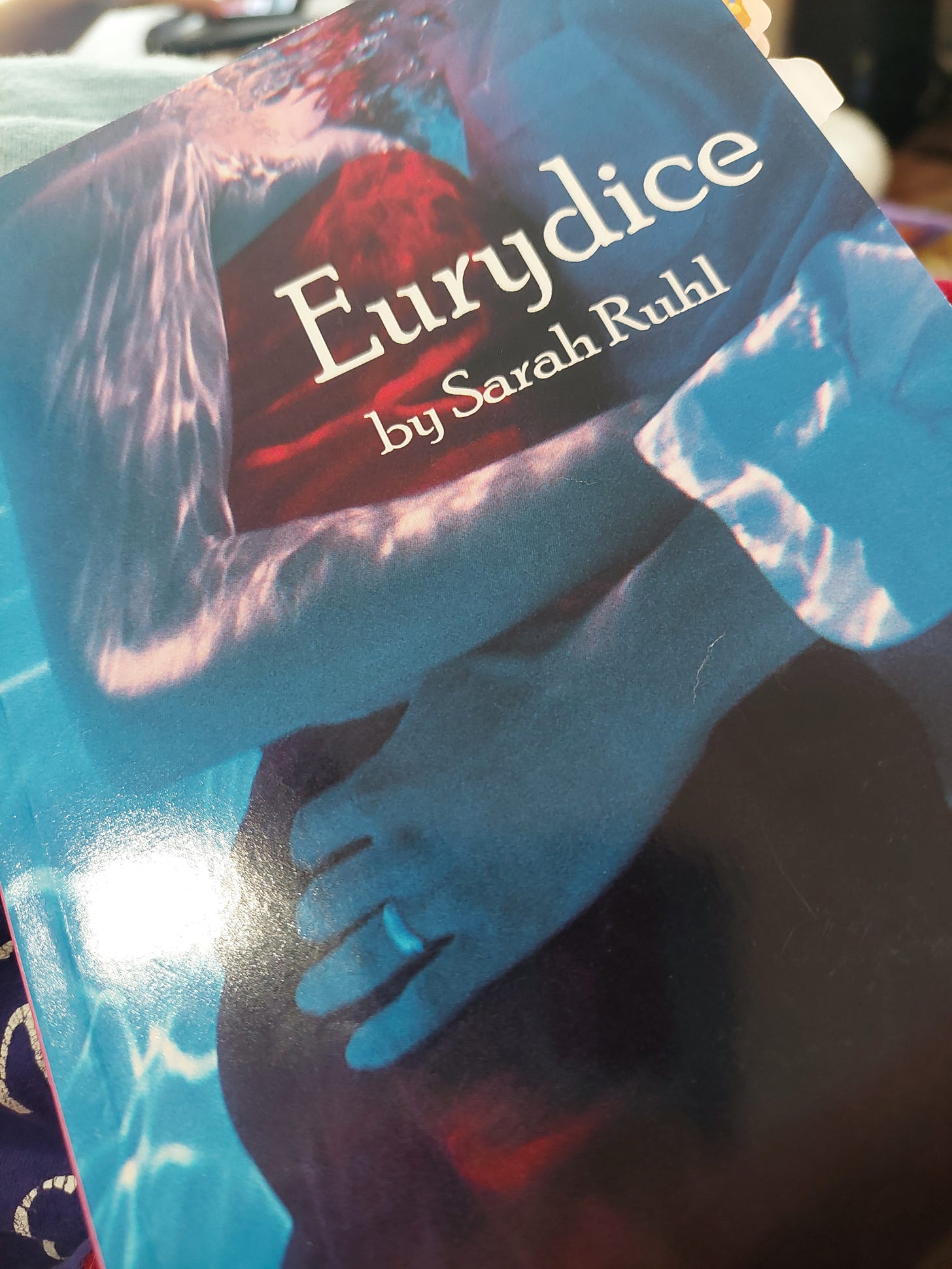The ancient Greek story of Orpheus and Eurydice has rejoined the zeitgeist recently because of Hadestown’s well-deserved popularity, but this non-musical play by Sarah Ruhl offers its own unique lens through which to see the ancient tale. While most tellings of this tale center around Orpheus, who undoubtedly has more agency (and is therefore more interesting) in the original story. However, in Eurydice, Sarah Ruhl gives at least some agency back to the titular character. Through Ruhl’s gorgeous poetic style, we follow the struggles and impossible choices that the ancient Greeks neglected on the first telling. Plus, there are umbrellas. Read 100 Essays I Don’t Have Time To Write to find out why.
Ruhl’s elevated language makes scenework from Eurydice a bit of an extra challenge, but working with her lovely writing is well worth the effort. For the purposes of this blog, I’ve chosen monologues and longer scenes that I think would work for class, but if you need a shorter scene, there are lots of good options here as well. It’s a great read!
Page numbers below come from the 2008 Samuel French edition:
First Movement, Scene 1: Eurydice & Orpheus pp.9-14
Though this scene is obviously exposition — it’s the first scene of the play — it does focus in on the young love between Orpheus and Eurydice for a long enough time to allow for some ebb and flow in their relationship. Like most young lovers, they struggle to understand each other throughout the scene. For the most part, they are able to let go of missed communication because they’re in love, but Ruhl plants the seeds of a complex relationship in this first scene. There is plenty for actors to work with.
Overall, the characters here don’t have any racial or cultural restrictions. Though the story is Greek, Ruhl sets it in the 1950s in what I assume is the United States, and I think the story works best if it takes on the multicultural lens of contemporary US theatre productions. This particular scene does include a kiss, which I think could be cut for classroom purposes. If it is left in, it should be moderated by an Initimacy Director or other responsible third party (like the instructor), especially with young actors.
First Movement, Scene 7: Man and Eurydice, pp. 22-25
Here, Eurydice has followed a strange man back to his apartment because he has a letter for her from her deceased father. It is as creepy as it sounds, but he does, in fact, have the letter. This gives both characters a clear need — the Man, to win Eurydice over and Eurydice to get that letter. These stakes make for good acting opportunities, and this may be the best scene for classwork in the play.
In my mind, it would track better if the Man were older than Eurydice, but the character moves through several ages throughout the course of the play, so he could reasonably be played by a person of any age. Again, race and ethnicity are very open, so this is easy to cast and use in a classroom setting.
Second Movement, Scene 13: Eurydice, p. 51
In this monologue, Eurydice describes Orpheus to her father. She may be reminiscing, expressing regret, or trying to convince her father that her choices were good — all are good options for an actor, though I think the last one is the most active and interesting. Any way you interpret it, the actor gets to play with Ruhl’s lovely poetic language, and the monologue packs a punch in a relatively short time. This is a great monologue for a young woman, and what acting class doesn’t have a lot of those? Check it out!
Second Movement, Scene 17: Orpheus, p. 52
There are a series of letters in this play that are passed mysteriously through the ground. This is one of those letters, but it also involves some direct requests from and connections with Eurydice. Orpheus asks her to stay true to him and describes his plan to go and rescue her. In some ways, he is also talking to himself — steeling himself for the difficult task that lies ahead of him. Again, the language is lovely, and the demographic group that could perform this piece is large. It’s a great tool to have in your toolbox!
Up Next on my TBR:
{AV:VR:RL} by Taylor Sklenar
Rez Politics by William Yellowrobe Jr.
Barefoot in the Park by Neil Simon
Thanks for reading! Feel free to share your thoughts!





